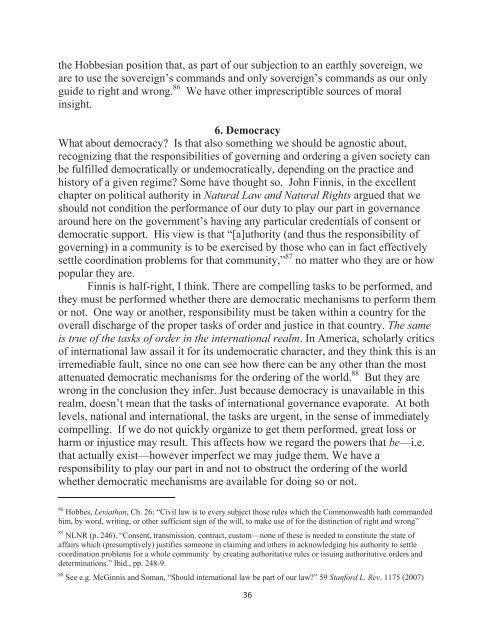International Legal Evangelism: Intelligence, Reconnaissance & Missions
International Legal Evangelism: Intelligence, Reconnaissance & Missions
International Legal Evangelism: Intelligence, Reconnaissance & Missions
Create successful ePaper yourself
Turn your PDF publications into a flip-book with our unique Google optimized e-Paper software.
the Hobbesian position that, as part of our subjection to an earthly sovereign, we<br />
are to use the sovereign’s commands and only sovereign’s commands as our only<br />
guide to right and wrong. 86 We have other imprescriptible sources of moral<br />
insight.<br />
6. Democracy<br />
What about democracy? Is that also something we should be agnostic about,<br />
recognizing that the responsibilities of governing and ordering a given society can<br />
be fulfilled democratically or undemocratically, depending on the practice and<br />
history of a given regime? Some have thought so. John Finnis, in the excellent<br />
chapter on political authority in Natural Law and Natural Rights argued that we<br />
should not condition the performance of our duty to play our part in governance<br />
around here on the government’s having any particular credentials of consent or<br />
democratic support. His view is that “[a]uthority (and thus the responsibility of<br />
governing) in a community is to be exercised by those who can in fact effectively<br />
settle coordination problems for that community,” 87 no matter who they are or how<br />
popular they are.<br />
Finnis is half-right, I think. There are compelling tasks to be performed, and<br />
they must be performed whether there are democratic mechanisms to perform them<br />
or not. One way or another, responsibility must be taken within a country for the<br />
overall discharge of the proper tasks of order and justice in that country. The same<br />
is true of the tasks of order in the international realm. In America, scholarly critics<br />
of international law assail it for its undemocratic character, and they think this is an<br />
irremediable fault, since no one can see how there can be any other than the most<br />
attenuated democratic mechanisms for the ordering of the world. 88 But they are<br />
wrong in the conclusion they infer. Just because democracy is unavailable in this<br />
realm, doesn’t mean that the tasks of international governance evaporate. At both<br />
levels, national and international, the tasks are urgent, in the sense of immediately<br />
compelling. If we do not quickly organize to get them performed, great loss or<br />
harm or injustice may result. This affects how we regard the powers that be—i.e.<br />
that actually exist—however imperfect we may judge them. We have a<br />
responsibility to play our part in and not to obstruct the ordering of the world<br />
whether democratic mechanisms are available for doing so or not.<br />
<br />
86 Hobbes, Leviathan, Ch. 26: “Civil law is to every subject those rules which the Commonwealth hath commanded<br />
him, by word, writing, or other sufficient sign of the will, to make use of for the distinction of right and wrong”<br />
87 NLNR (p. 246). “Consent, transmission, contract, custom—none of these is needed to constitute the state of<br />
affairs which (presumptively) justifies someone in claiming and others in acknowledging his authority to settle<br />
coordination problems for a whole community by creating authoritative rules or issuing authoritative orders and<br />
determinations.” Ibid., pp. 248-9.<br />
88 See e.g. McGinnis and Soman, “Should international law be part of our law?” 59 Stanford L. Rev. 1175 (2007)<br />
<br />
36

















